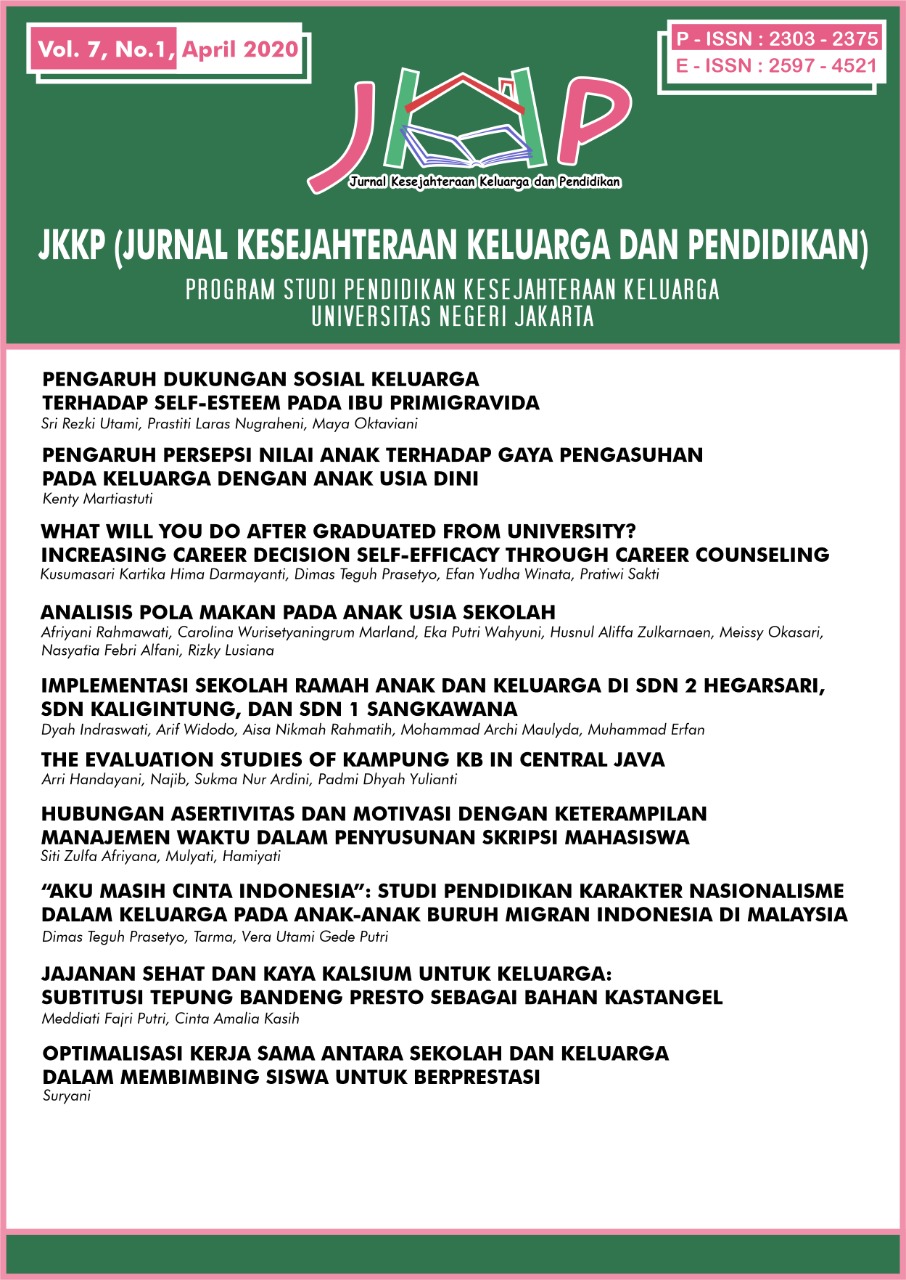IMPLEMENTASI SEKOLAH RAMAH ANAK DAN KELUARGA DI SDN 2 HEGARSARI, SDN KALIGINTUNG, DAN SDN 1 SANGKAWANA
DOI:
https://doi.org/10.21009/JKKP.071.05Keywords:
child-friendly school, family, implementationAbstract
Kasus kekerasan terhadap anak yang terjadi di sekolah menjadi salah satu alasan program Sekolah Ramah Anak (SRA). Penelitian ini dilakukan di tiga SD di tiga provinsi yang berbeda yaitu Jawa Barat, Daerah Istimewa Yogyakarta, dan Nusa Tenggara Barat. Lokasi penelitian adalah SDN 2 Hegarsari, SDN Kaligintung, dan SDN 1 Sangkawana. Penerapan Sekolah Ramah Anak (SRA) akan dievaluasi dengan merujuk pada 6 komponen yaitu kebijakan SRA, pelaksanaan kurikulum, pendidik dan tenaga kependidikan terlatih hak-hak anak, sarana dan prasarana SRA, partisipasi anak, partisipasi warga diluar sekolah. Penelitian ini menggunakan pendekatan kualitatif. Subyek penelitian adalah kepala sekolah, guru, tenaga kependidikan, orang tua siswa, dan beberapa siswa kelas 6. Teknik pengumpulan data menggunakan observasi, wawancara, dokumentasi, dan tinjauan literature. Validitas data dilakukan dengan triangulasi sumber. Teknik analisis data untuk penelitian kualitatif terdiri dari reduksi data, tampilan data, dan verivikasi data. Kesimpulan dari penelitian ini menunjukkan bahwa ketiga SD yang menjadi subyek penelitian sudah menjadi sekolah ramah anak baik secara fisik maupun non fisik, meskipun ada beberapa sarana yang harus dilengkapi. Ketiga sekolah secara umum sudah menjadi tempat yang aman dan nyaman bagi siswa dalam melaksanakan proses belajar.
Kata kunci: implementasi, keluarga, sekolah ramah anak
Implementation of Children and Family Friendly Schools in SDN 2 Hegarsari,
SDN Kaligintung, and SDN 1 Sangkawana
Abstract
Cases of violence against children that occur in schools are one of the reasons for the Child-Friendly School (SRA) program. This research was conducted in three elementary schools in three different provinces, namely West Java, Yogyakarta Special Region, and West Nusa Tenggara. The research locations were SDN 2 Hegarsari, SDN Kaligintung, and SDN 1 Sangkawana. The implementation of a Child-Friendly School (SRA) will be evaluated by referring to 6 components, namely the SRA policy, curriculum implementation, educators and education personnel trained in child rights, SRA facilities, and infrastructure, child participation, citizen participation outside school. This research uses a qualitative approach. The research subjects were the principal, teachers, education staff, parents of students, and several 6th-grade students. Data collection techniques used observation, interviews, documentation, and literature review. Data validity is done by source triangulation. Data analysis techniques for qualitative research consist of data reduction, data display, and data verification. The conclusion of this study shows that the three elementary schools which were the subject of the study have become child-friendly schools both physically and non-physically, although several facilities must be equipped. The three schools, in general, have become a safe and comfortable place for students to carry out the learning process.
Keywords: child-friendly school, family, implementation
Downloads
Published
Issue
Section
License
Authors who publish with this Journal agree to the following terms:
- Author retain copyright and grant the journal right of first publication with the work simultaneously licensed under a creative commons attribution licensethat allow others to share the work within an acknowledgement of the work’s authorship and initial publication of this journal.
- Authors are able to enter into separate, additional contractual arrangementfor the non-exclusive distribution of the journal’s published version of the work (e.g. acknowledgement of its initial publication in this journal).
- Authors are permitted and encouraged to post their work online(e.g. in institutional repositories or on their websites) prior to and during the submission process, as it can lead to productive exchanges, as well as earlier and greater citation of published works.
Users/public use of this website will be licensed to CC BY SA
![]()







